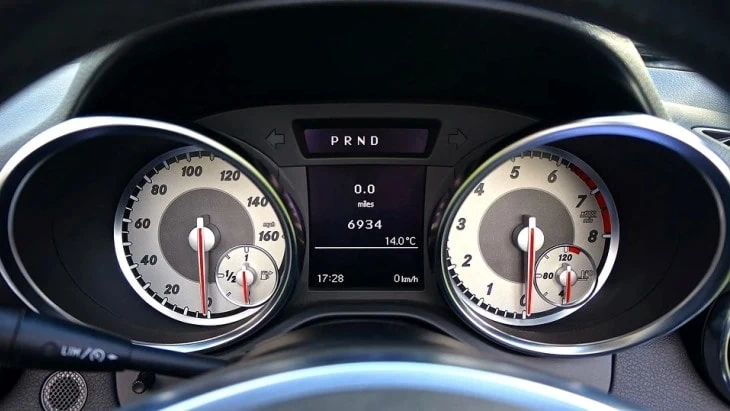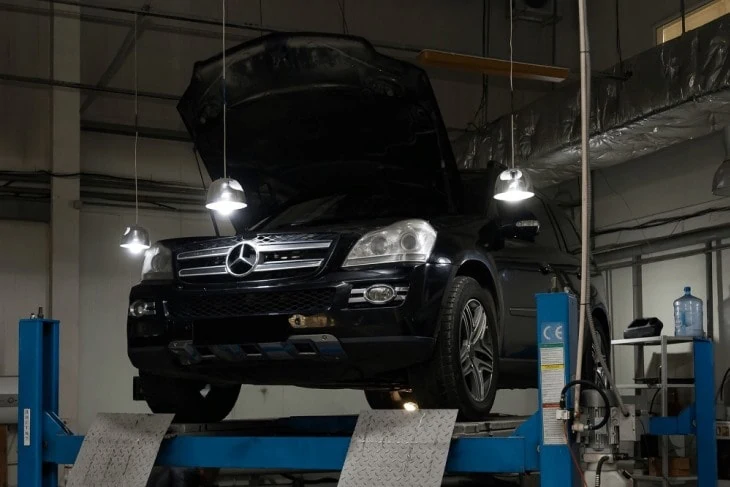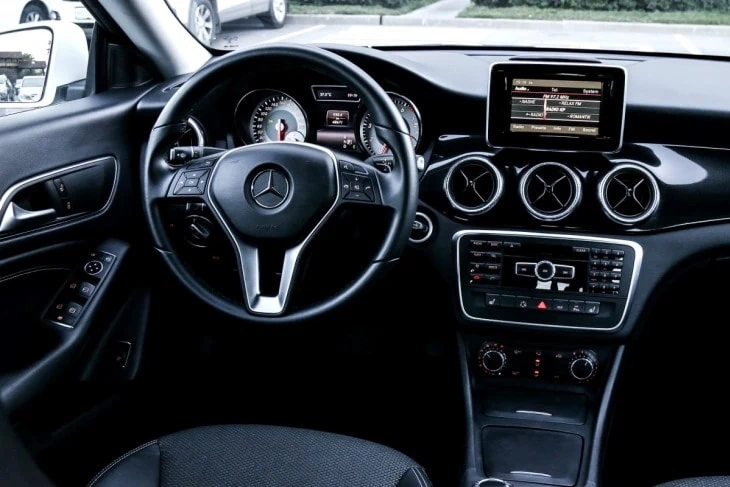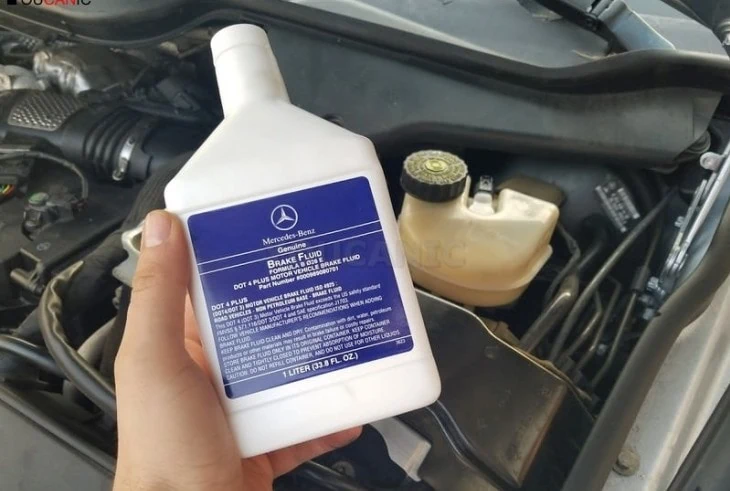
Mercedes Benz is a German luxury car manufacturer known for their sleek cars. These German cars have a reputation for blending sturdiness and elegance. However, do they really last longer than most other cars? Are they as reliable? What is usually the first thing to break down in a Mercedes? Do some Mercedes Classes last longer than others?
As with any luxury foreign car, you pay extra for the vehicle, and then even more for the parts and repair. Mercedes owners should expect high repair costs. So, how long do most Mercedes cars last, in general?
Most Mercedes last between 150,000-200,000 miles, or 10 – 13 years (assuming an annual mileage of 15,000 miles). The Mercedes E-Class is known to have better longevity, and may last 200,000-250,000 miles, or up to 17 years. The Mercedes C-Class is reported to have the shortest lifespan.
- How Many Miles Does a Mercedes Last?
- How Many Years Does a Mercedes Last?
- How Does Mercedes’ Longevity Compare to Other Cars?
- Are Mercedes Cars Reliable?
- Repair Frequency
- Hodnocení spolehlivosti
- Common Problems Before 100,000 Miles
- Common Problems After 100,000 Miles
- Pravidelné výměny oleje
- Keep the Fluids Full
- Regulate Tire Pressure
How Many Miles Does a Mercedes Last?
![]()
There are varied answers to this question. On average, a well-cared for Mercedes should last 150,000-200,000 miles. These cars are known to be trustworthy and sturdy, overall.
In particular, the E Class models of the Mercedes line are reported to have long lives, often well past 200,000 miles. This model is a favorite because of its longevity and reliability. There are online Mercedes reports of vehicles with 300,000 miles or more!
How Many Years Does a Mercedes Last?
The average driver puts about 15,000 miles per year on a vehicle. If we do the math, most Mercedes should last 10-13 years. However, some of the E Class Mercedes may run up to 17 years or more.
Some owners even claim that their Mercedes are running strong after 30 years. However, you should not expect this kind of vehicle lifespan!
How Does Mercedes’ Longevity Compare to Other Cars?
Most modern cars last around 150,000 to 200,000 miles or 10-12 years. Mercedes falls into that average lifespan range.
Not many years ago, cars were only expected to last up to 100,000-150,000 miles. Thanks to advances in technology and mechanics, vehicle longevity has increased. In the past, Mercedes usually had a longer-than-average lifespan than the average car.
Are Mercedes Cars Reliable?
Even with a long life span, car owners want to know if their vehicle is going to be reliable. Costly repair bills or the possibility of being stranded with a broken-down vehicle are not appealing prospects.
Repair Frequency
![]()
Just how often is your Mercedes going to be in the shop? This is particularly important as foreign car brands, like Mercedes, usually cost more to repair. Parts need to be imported or can be more difficult to find, so expect higher repair bills. Remember, Mercedes are considered to be a luxury vehicle, thus expect to pay luxury vehicle fees.
According to Repair Pal, Mercedes come with a price. Due to the expense of foreign parts, the average annual service cost for a Mercedes is higher than the national average. On average the annual repair cost for a Mercedes is $908. This is higher than the national average of $652 for all car models.
Mercedes also visit the mechanic more often than average. Mercedes average 0.7 trips to the shop per year for unscheduled repairs, as opposed to the national average of 0.4 for all vehicle models.
Hodnocení spolehlivosti
Repair Pal gives Mercedes a 3.0 out of 5.0 for reliability. This places it in 27th place out of 32 for all car brands. This rating takes into account the cost, frequency, and severity of problems and repairs. A reason Mercedes has such a low rating is due to the high price associated with foreign parts.
Some classes of Mercedes are more reliable than others. For example, the E class has a reputation for longevity and reliability.
What Are the Most Common Problems with Mercedes?
![]()
Mercedes typically come with a 4-year, or 50,000-mile warranty. This type of warranty is normal for luxury cars and covers unusual problems. The owner is responsible for routine maintenance costs, like oil changes, and fluid refills.
Common Problems Before 100,000 Miles
Some Mercedes owners reported problems with their cars around 60,000-100,000 miles. These issues usually were:
- Spark Plug Problems – Spark plugs ignite the air and fuel mixture in a combustion engine. Spark plugs fail due to repeated overheating, often because of pre-ignition. Pre-ignition causes heat to build up in the engine, then the spark plugs overheat. Mercedes are known to have spark plug failure, which can cause rough idling, poor gas flow, or difficulty starting. Fortunately, spark plugs are easy and inexpensive to replace.
- Catalytic Converter Failure – The catalytic converter takes the toxic car exhaust and converts it to non-toxic gasses. After 60,000 many Mercedes are known to have catalytic converter failure due to blockages. This can cause the car to have black exhaust smoke, difficulty starting, poor fuel efficiency, or other problems. Replacement costs for the catalytic converter vary depending on the model.
- Selhání zapalování. The ignition relies on a spark to ignite the fuel and air and start the engine. If the spark isn’t lighting properly, the engine will not start. Some Mercedes experience ignition failure around 75,000 miles.
Common Problems After 100,000 Miles
After 100,000 miles, some Mercedes had the same issues listed above, but often there were other problems that developed. Here are a few of the issues that may come up with Mercedes after 100,000 miles:
- Rust is a fact of life for any aging vehicle. Even a luxurious Mercedes will eventually rust. Careful washing and storing the vehicle in a garage will help prolong the life of the body.
- Suspension System Issues – The suspension system may start to fail after 100,000 miles. One of the main roles of the suspension is to create a smooth ride so that you can’t feel every bump in the road. It also keeps the car level. The ride may feel bumpy, the car may not look level, or it may pull to one side if the suspension is failing. The suspension may need a repair or to be replaced at this point.
- Steering System Failure – It is very dangerous when a steering system fails. If the steering wheel feels loose, or you can hear noise when you turn, it is best to get it checked out, and repaired or replaced before it completely fails.
- Transmission Issues – Mercedes has one of the most robust transmission systems out there. However, the 13-pin connector and valve in an automatic transmission can have issues after 100,000 miles. It may start to leak fluid and cause rough shifting. Make sure to have the transmission checked regularly after 100,000 miles.
Do Mercedes Cars Hold Their Value?
It depends on the model! There is a wide variety of resale values across the Mercedes Benz vehicles. Vehicles manufactured in 2016-2018 retain their value the best. In fact, the 2018 model has a 39 percent depreciation rate.
How Many Miles Will a Mercedes E350 Last?
The Mercedes E350 is a reliable, luxury sedan that has been around since 2006. The E-Class of Mercedes has a reputation for longevity. Most E350’s will last 200,000-250,000 miles or 13-17 years.
How Many Miles Will a Mercedes C300 Last?
The Mercedes C-Class vehicles are more compact, and very popular. The C300 typically lasts 150,000-200,000 miles, or 10-13 years before it needs an engine rebuild. Many owners report C300’s lasting at least 200,000 miles, or even up to 300,000 miles.
How Many Miles Can a Mercedes ML320 Last?
The Mercedes M-Class are durable SUV’s that were launched in 2002. With proper maintenance and care, these luxurious vehicles can make it to 200,000-250,000 miles before needing major repairs.
How Many Miles Can a Mercedes S550 Last?
The Mercedes S550 is a sleek, luxurious sedan that is known for a long lifespan. The S550 should last at least 200,000 miles, and even up to 400,000 miles. That’s a lifetime of 15-25 years.
Maintain a Mercedes for Long Life
Proper care, maintenance, and careful driving can extend the life of your vehicle. A Mercedes is no exception. Check your owner’s manual for the recommended maintenance schedule.
Pravidelné výměny oleje
The oil in the engine is extremely important to keep it running smoothly. It lubricates the moving parts, keeps the engine clean, and helps with cooling. Old, dirty oil will cause issues in the engine.
Get an oil changed every 3,000 miles or six months, whichever comes first. Check the oil level regularly to ensure that the engine is not low on oil.
Keep the Fluids Full
![]()
Routinely check the fluids in the vehicle. If anything is low, top it off. The fluids to check regularly are:
- Převodová kapalina –The transmission fluid cools and lubricates the transmission. If it is low, the engine may surge, and the vehicle will have difficulty shifting. Put the car in neutral and check the transmission fluid while it is running.
- The coolant keeps the engine cool in the summer, and keeps it from freezing in the winter. The antifreeze can break down over time, so make sure to check it regularly, especially if the vehicle has over 50,000 miles.
- Brzdová kapalina – The brake fluid gets pushed out of its reservoir, fills the lines, and helps stop the car when you push the brake pedal. As the brake pads wear out, the fluid level also goes down. Get the brakes and fluid checked regularly.
- Windshield Washer Fluid – This often neglected fluid is very important for safety reasons. It sprays onto the windshield to keep it clean and allow you to see the road. How often you refill the windshield washer fluid depends on how often you use it.
Regulate Tire Pressure
Consistent tire pressure will not only help your tires last longer, but it is good for your suspension, too. Check tire pressure regularly, and keep tires inflated to the recommended specifications.
Závěrečné myšlenky
Owning a Mercedes Benz is often a symbol of wealth and luxury. However, do they really last longer than most other cars? Not really. Most classes of Mercedes last 150,000-200,000 miles, or 10-13 years, just like the average car on the market today. The stand-out class, the E-Class, does seem to have better longevity than the other models.
O Stevu Frelingovi
Steve pracoval více než 20 let jako automechanik a později provozoval vlastní opravnu automobilů i motocyklů. Je to nadšenec do údržby a obecně docela dobrý v odstraňování problémů!


















